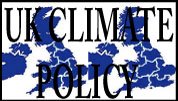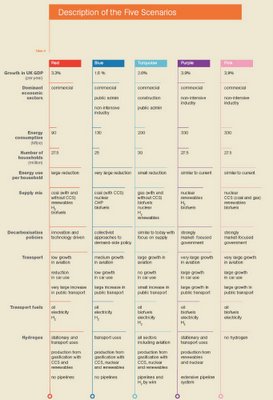Report of the Week- Decarbonising the UK (Tyndall Centre)
 The Tyndall Centre recently produced a major report entitled "Decarbonising the UK: Energy for a Climate Conscious future". This report was the result of research undertaken in one of the Tyndal centres four major themes of research and represents the combined knoledge of world renowned experts from the universities of Oxford, Cambridge, UEA, Manchester and others.
The Tyndall Centre recently produced a major report entitled "Decarbonising the UK: Energy for a Climate Conscious future". This report was the result of research undertaken in one of the Tyndal centres four major themes of research and represents the combined knoledge of world renowned experts from the universities of Oxford, Cambridge, UEA, Manchester and others. The work developed 5 scenarios for reaching the govornments 60% reduction target by 2050, and then analysed these diverse pathways for clear messages. One clear message they derived from there work was that:
The work developed 5 scenarios for reaching the govornments 60% reduction target by 2050, and then analysed these diverse pathways for clear messages. One clear message they derived from there work was that:
"growth in aviation must be dramatically curtailed from both current levels and [the] historical trend"
The report looks at the whole of the UK economy including the aviation industry which the govornment somehow managed to ommit from its calculations when designing the energy white paper. The various scenarios:
"Do not lend themselves to simple charachterisation whether in terms of energy supply, innovation,energy efficiency or economic growth."What they do however is explore the various ways govornments can act i.e modulating market forces or straiht intervention, and then show some of the options down a given path. Some interesting findings include: the placement of Carbon Capture and Storage and nuclear as clear rivals for a low carbon energy baseload Nuclear; the increasingly distributed nature of generation in all scenarios that can reach the 60% cut; the vital importance of behavioural change; the prefrability of low energy scenarios over equally carbon adequate high energy scenarios for reasons of sustainability.
When looking at the demand side, four key variables where identified: households, transport, international shipping and structural changes in the economy. Decarbonisation of the supply side was seen to depend on eight key factors:
1. Availability of fossil fuels
2. Sucess of CCS
3. Role of nuclear
4. Penetration of Renewables
5. Availability of Hydrogen
6. Availability of Biofules
7. Decentralised/Centralised energy systems.
( I have actually looked at 4 of these, nuclear and peak oil i will leave to other people. Availability of hydrogen from various methods may be a future article)
The five scenarios are shown in the diagram below along with the various technologies involved with each, all scenarios include a diversity of approaches, there is no magic bullet but several key choices to be made with each approach.
Postscript: Climate Change, ReportA, UKA


Home









0 Comments:
Post a Comment
<< Home